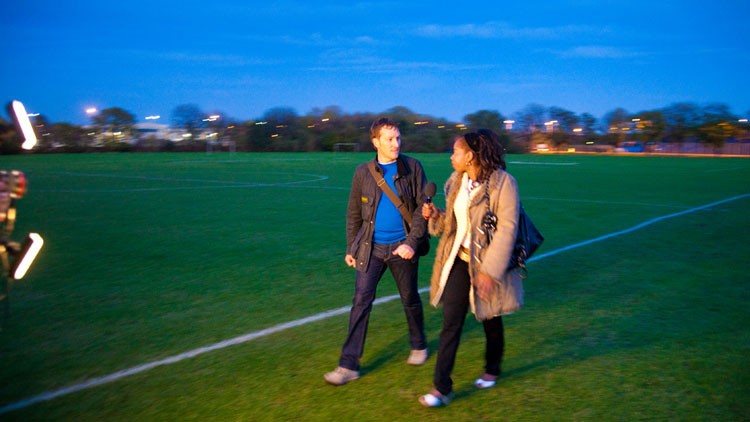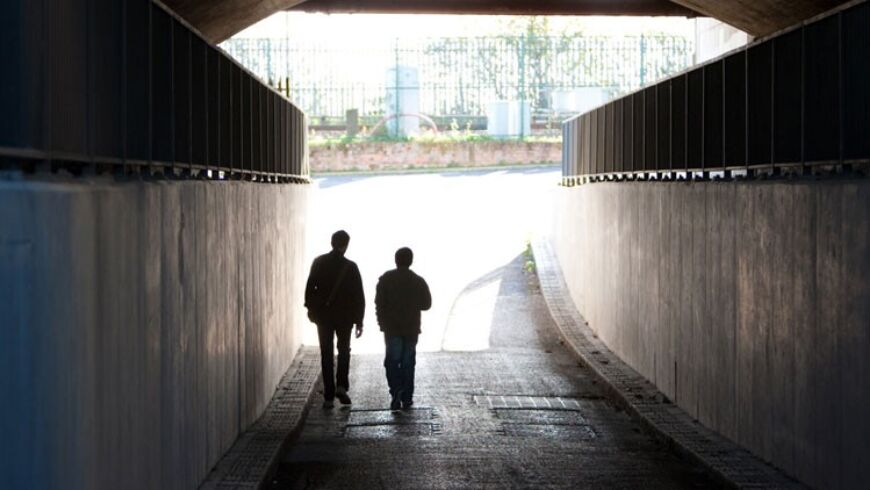Another time. A different event.
Sukhdev Sandhu
Read author Sukhdev Sandhu's original text commissioned for Memory Marathon, reflecting on the impact of recollecting significant cultural events and the acoustic framework of memory
Projects
Re-watching Simon Pope’s Memory Marathon recently, my mind went back to 12 September 2001, the day after the Twin Towers in New York had been felled, a long and lonesome and aching day. Living in the city at that time, I spent many hours wandering through the hushed streets of its downtown neighbourhoods. At one point, somewhere around Washington Square, I was approached by a pair of researchers from New York University’s Department of Psychology: they said they were looking for volunteers to recall as vividly and precisely as possible everything they had seen, felt and done in the previous 24 hours.
I declined the invitation to help. Partly because it seemed they, like many people over the next few weeks and months – politicians, most obviously – were seeking to use the atrocity for their own agenda. More than that: their project was surely silly. Who could possibly forget what had just happened? The immensity of the attack, the immediate transformations to the city’s skyline, the acres of newsprint and television coverage time given over to telling and retelling what had happened: how likely was it that anyone in Manhattan would have to scratch their head?
It turns out I was wrong. A couple of years later I read a magazine article about those academics’ research. They’d interviewed individuals on a few occasions; each time their stories changed significantly. People claimed to have seen things or been to locations in the city that, when previously questioned, they had never mentioned. Some appeared to be appropriating the narratives of friends. Others were rehashing stories they could only have read in books. Were they fantasists? Sadsacks who wanted to feel they had witnessed or played some significant part in history? It would have been easy to accuse them of some kind of false consciousness, but the researchers were sanguine: when it comes to memory, they explained, facts are not sacred; facts may be fuzzy concepts.
Simon Pope has known this a long time. Over the last decade he’s created a rich body of work – somewhere between landscape art and perambulatory performance – in which, quietly and sometimes ironically, he’s dramatised the complex and often creative interplay between reality and imagination, between pointillist details and the drifting poetics they inadvertently inspire.
Memory Marathon takes this tension-tango to another level; in an era when countless websites and databases offer ever-closer statistical breakdowns of sporting performances (Metres covered! Percentage of passes completed!), and when technology – whether manipulated by global entertainment companies or mobile-phone-wielding crowd members – allows more events than ever before to be recorded, circulated and forensically analysed by fans and professionals alike, it’s easy to assume that a culture of consensus around sports spectacles is possible.
What’s initially so arresting about Memory Marathon is its sound, its restrained ambience. Watched today, when echoes of the euphoric amplification and carnivalesque hoop-la of the 2012 Games have not fully subsided, Pope’s film strikes a different note; it claims the right – and possibly the need – to think about the Olympics according to a different acoustic framework. In the five boroughs through which the artist and his interlocutors walk it’s possible to hear birds, the swish of traffic and street markets, pavement patter, jolts of local idioms, globs of near silence. This is a quotidian sonic environment – far from the blare of media headlines, cheerleading slogans and choreographed noise worlds audible last summer. Here it’s possible to articulate – and apprehend – a more texturally rich set of Londoners’ recollections of bygone Olympics.
Those recollections, though claimed as special, are often inaccurate: one person thinks the 1936 Games were held at Nuremberg rather than Berlin, while another, who has otherwise photographic recall of 400-metre sprinter Derek Redmond being helped to the finishing line by his father in 1992, believes it took place in the final rather than the semi-final. Someone even refers to an English middle-distance runner called ‘Steve Overt’.
The keenest memory is about mediation: the pleasure of watching the Games on television with family or friends, the warm glow of this collective experience. Today, in spite of – or perhaps because of – the profusion of viewing contexts (cable, the internet, smartphones), live sport represents a rare occasion for an increasingly fragmented nation to think of itself in terms of collectivity rather than collage.
It’s mostly a temporary camaraderie. Back in 2012, when Belgium-born ‘Wiggo’, Somalia-born Mo Farah and mixed-race Jessica Ennis were winning golds, it was claimed that multiculturalism – reviled the previous year by David Cameron for ‘the weakening of our collective identity’, but strategically and heavily invoked by Sebastian Coe when it came to selling London to the IOC (as well as by the Prime Minister himself who, the day before the Opening Ceremony, claimed there was ‘no more diverse, more open, more tolerant city in the world’) – should be celebrated. Since then, Home Office vans have been telling illegal immigrants to go home, while landlords have been urged to interrogate the immigration status of would-be tenants.
One of the most poignant scenes in Memory Marathon comes when a South Londoner, who’s been telling a clearly-tickled Pope about how all her old pals used to run around the playground pretending to be Daley Thompson, reaches the site of her primary school. It’s no longer there and though she doesn’t overegg the situation she’s briefly shocked, disappointed. Her loss is that of many British people in recent years; they have seen school playgrounds, allotments, traveller sites and many other valuable spaces sold to developers. (The financial crisis meant that some of these developers were eventually bailed out using public money.)
Pope’s film reminds us that the Olympics – like other deadline-driven sports spectacles – are struggles around memory. Organisers morph into historiographers and draft vivid national narratives. They commandeer and commodify versions of the past; they use strategic amnesia to obscure democratic deficits and bad stories around their present activities; they increasingly deploy the language of ‘legacy’ as a form of future-grabbing, a way to determine and control the criteria by which success is to be gauged.
And everyone else? Not all are refuseniks or dissenters. Many don’t know or don’t care about the compulsory purchases and geographic transplantations carried out in the name of sporting drama. Some may harbour doubts about the wisdom, in a period of austerity and welfare shrinkage, of blowing billions of pounds on a two-week pageant of elite physicality; others had the times of their lives, were transported by the feats and endeavours they watched, wished the whole thing could have lasted longer. Are they guilty of capitulating to state-sponsored fantasies, to late capitalism’s bling iterations of bread and circuses? Or do they see in the struggles of the athletes compellingly visceral versions of the battles they themselves wage – for sanity, structure, the transcendence of daily worries?
If, in a few years time, Simon Pope revisits the 2012 Games for another Memory Marathon, I can guarantee he will find no clear-cut answers to these questions. But he will find lots of (black) humour, pathos, idiosyncratic reveries, enjoyably meandering mystification, curious contradictions. All the things, in fact, that make this Memory Marathon so resonant and lingering.
--
Sukhdev Sandhu is Director of the Colloquium for Unpopular Culture at New York University, runs the Texte und Töne publishing imprint, and is the author of London Calling: How Black and Asian Writers Imagined A City, Night Haunts, and Other Musics.


